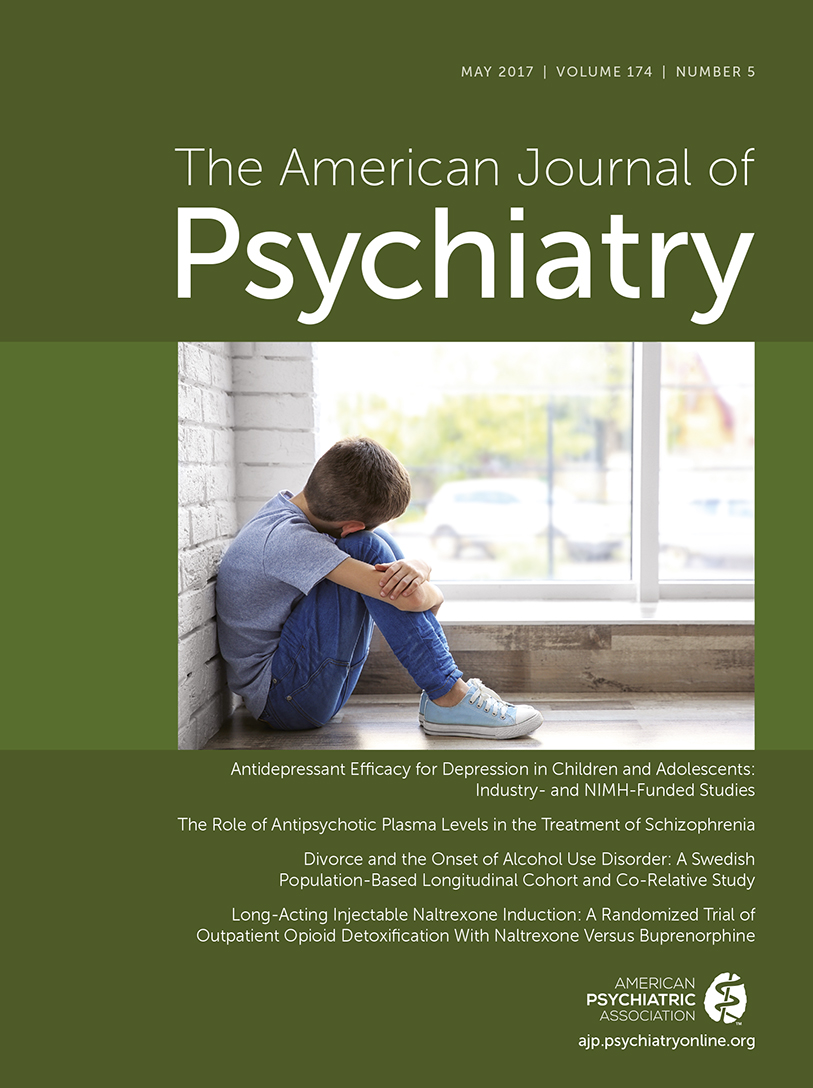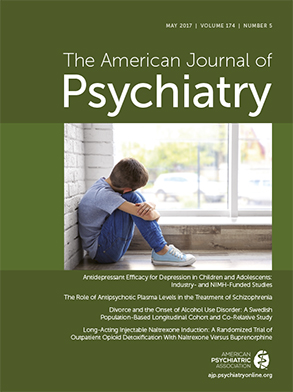Trial-and-error (heuristic) prescribing is part and parcel of everyday clinical practice. While a blend of communication, common sense, clinical acumen, and experience enhances the tailoring of medications to individual patients, there is still a significant luck factor involved in outcomes. Furthermore, factors such as childhood trauma, substance misuse, and situational stressors may limit the likelihood of adequate outcomes with pharmacotherapy.
The search for clinically translatable treatment biomarkers—to help stack the odds of good outcomes in favor of our patients—has been disappointing thus far. However, in this issue of the
Journal, Marshe et al. (
1) add to the evidence base for genetic treatment biomarkers in antidepressant prescribing. Given the large global burden of disease from major depression (
2) and the limited pipeline of pharmacological innovations in the treatment of depression, the hope of using genetics to more effectively guide the use of existing antidepressants has driven much interest.
Over 2 million people suffer late-life depression in the United States, and less than half of them achieve remission when treated with antidepressants (
3). Marshe et al. conducted a study of 350 older adults (age 60 and older) who were treated with venlafaxine for major depression. Clinical dosing was escalated to robust levels (300 mg) if needed. Differential symptom remission rates were stratified by several genetic variants in noradrenaline and serotonin pathways, in hopes of identifying genetic variants associated with better or worse outcomes with venlafaxine treatment. Interestingly, a common polymorphism (rs2242446) in the norepinephrine transporter gene was significantly associated with a 1.67-fold greater odds of remission and a 2-week shorter time to remission. This finding adds to a growing suite of polymorphisms associated with differential antidepressant remission rates, and it is of a clinically meaningful effect size. Knowledge of such polymorphisms may assist clinicians in making a more informed individual clinical risk-benefit analysis when treating older adults with venlafaxine.
While genetically guided prescribing (pharmacogenetics) in psychiatry is promising, it remains controversial because of mixed findings in the empirical literature. The basic premise appears sound: matching the pharmacological profile of the medication to the patient’s associated DNA profile may reduce trial-and-error prescribing decisions. But the clinical utility of antidepressant pharmacogenetics has yet to be robustly replicated in randomized controlled trials (
4). Such evidence is needed to demonstrate superiority over the current gold standard—heuristic trial-and-error prescribing (
5). However, there are promising signals emerging in the literature, and there is growing interest in the potential of such technology, by various stakeholders, not least third-party payers seeking technologies to help reduce total cost of care (
6).
Currently, psychiatric pharmacogenetics represents the standard of care for just one narrow clinical situation. When considering prescribing carbamazepine to patients with Asian ancestry, HLA genotyping (now inexpensive and accessible) should be offered to better assay the risk of Stevens-Johnson syndrome (
7). Beyond this clinical situation, routine use of pharmacogenetics is not yet recommended in depression treatment guidelines (
7,
8), but the commercial availability of pharmacogenetic testing to guide medication dosing—particularly antidepressants—is growing (
6).
This growth can be attributed in part to a top pharmacogenetics body, the Clinical Pharmacogenetics Implementation Consortium (CPIC), which has published guidelines on the use of hepatic metabolizer status genotyping (cytochrome P450 CYP2D6 and CYP2C19) in dosing various antidepressants (
9). CPIC is a non–industry funded group of international academics coordinated by Stanford University. Unfortunately, CPIC guidelines are not based on prospective randomized controlled trials comparing genetically guided prescribing with unguided prescribing, so they cannot shed light on the clinical utility of pharmacogenetic testing over heuristic prescribing. Despite this important limitation, if CYP2D6 and CYP2C19 metabolizer status is known, both CPIC and U.S. Food and Drug Administration guidelines recommend that prescribers consider such information in making medication decisions (
9,
10). This has important clinical and medico-legal implications, because if such information is at hand and not considered, adverse medication outcomes could be blamed on failure to consider such information. What should a “reasonable” clinician do?
Clinicians should be ready for patients asking about pharmacogenetic testing, and some patients even presenting with such information. Again, other than for carbamazepine in Asian patients, it is reasonable to advise patients that pharmacogenetics is not yet established standard of care in psychiatry because of its still limited evidence base. Independently replicated randomized controlled trials will be needed to draw firmer conclusions about the merits of such testing. To date, only three such trials have been completed (all industry sponsored); two were positive, and the other yielded a nonsignificant trend supportive of the utility of antidepressant pharmacogenetics (
11–
13). Additional randomized trials are under way, and they will help shed more light on the clinical merits of antidepressant pharmacogenetics.
As we await results from further trials, one could safely speculate that the story will be much more complex than a tale of gene variants alone, with environmental factors (and associated epigenetic modifications), drug-drug interactions, hepatic and renal impairments, and compliance issues all important to effective prescribing. At best, pharmacogenetics will be a helpful guide to optimal personalized prescribing, and at worst, a distraction and an unnecessary cost (
6). However, with a growing focus on “patient empowerment” and “shared decision making” (
14) to enhance engagement, compliance, and outcomes, antidepressant pharmacogenetics continues to attract considerable academic, governmental, and commercial interest.
Antidepressant pharmacogenetics has the potential to reduce trial-and-error prescribing and improve patient outcomes. While the area is viewed with mixed feelings by the profession, it seems premature to “throw the baby out with the bathwater” before more clinical trials are conducted and more comprehensive gene panels developed. In the meantime, it is important for clinicians to keep abreast of this evolving area to best facilitate informed discussions with their patients. If the evidence base strengthens and clinical acceptance reaches a tipping point, genetically guided antidepressant prescribing may become part of routine clinical practice—but, as Nobel laureate physicist Niels Bohr remarked, “Prediction is very difficult, especially about the future.”

